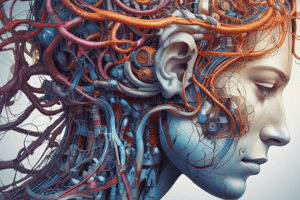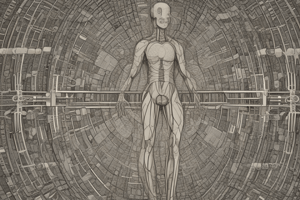Podcast
Questions and Answers
What is the primary function of neural coordination?
What is the primary function of neural coordination?
- To regulate cognitive functions
- To process sensory information
- To integrate and coordinate neural activities to produce movement and behavior (correct)
- To control emotional responses
What is the term for the process by which the nervous system regulates muscle contraction and relaxation?
What is the term for the process by which the nervous system regulates muscle contraction and relaxation?
- Motor control (correct)
- Neural adaptation
- Motor learning
- Sensory integration
What type of neural coordination is characterized by a top-down approach, where higher-level centers control lower-level centers?
What type of neural coordination is characterized by a top-down approach, where higher-level centers control lower-level centers?
- Distributed control
- Hierarchical control (correct)
- Sensory-motor integration
- Neural oscillations
What is the term for rhythmic patterns of neural activity that help synchronize neural and muscular activity?
What is the term for rhythmic patterns of neural activity that help synchronize neural and muscular activity?
What is the term for the ability of neural connections to change and adapt in response to experience and learning?
What is the term for the ability of neural connections to change and adapt in response to experience and learning?
What is the term for the use of neurotransmitters to modulate neural circuits and influence behavior?
What is the term for the use of neurotransmitters to modulate neural circuits and influence behavior?
During which stage of brain development does the formation of neural tube from ectoderm occur?
During which stage of brain development does the formation of neural tube from ectoderm occur?
What is the primary function of myelination in brain development?
What is the primary function of myelination in brain development?
During which stage of brain development is the cerebral cortex formed?
During which stage of brain development is the cerebral cortex formed?
What is the term for the brief storage of sensory information?
What is the term for the brief storage of sensory information?
What is the term for the process of transferring information from short-term to long-term memory?
What is the term for the process of transferring information from short-term to long-term memory?
What is the term for the process of initially processing and storing information in short-term memory?
What is the term for the process of initially processing and storing information in short-term memory?
Study Notes
Neural Coordination
Neural coordination refers to the process by which the nervous system integrates and coordinates the activities of various neurons, muscles, and other effectors to produce purposeful movements and behaviors.
Key Concepts:
- Motor control: the process by which the nervous system regulates the contraction and relaxation of muscles to produce movement.
- Sensory feedback: information about the environment and the body's position and movement, which is used to adjust and refine motor responses.
- Neural circuits: networks of interconnected neurons that work together to perform specific functions.
Types of Neural Coordination:
- ** Hierarchical control**: a top-down approach, where higher-level centers in the brain send signals to lower-level centers to control movement.
- Distributed control: a bottom-up approach, where multiple neurons and muscles work together to produce movement, without a single central controller.
Mechanisms of Neural Coordination:
- Neural oscillations: rhythmic patterns of neural activity that help to synchronize and coordinate the activity of different neurons and muscles.
- Synaptic plasticity: the ability of neural connections to change and adapt in response to experience and learning.
- Neuromodulation: the use of neurotransmitters to modulate the activity of neural circuits and influence behavior.
Examples of Neural Coordination:
- Walking: a complex behavior that requires the coordination of multiple limbs, muscles, and sensory inputs.
- Reaching and grasping: a behavior that requires the coordination of arm, hand, and finger movements to perform a specific task.
- Eye-hand coordination: the ability to coordinate eye movements with hand movements to perform tasks such as catching or throwing.
Functions of Neural Coordination:
- Motor learning: the ability to learn and adapt new motor skills through practice and repetition.
- Motor planning: the ability to plan and execute complex movements in advance.
- Motor recovery: the ability to recover from injuries or disorders that affect motor function.
Studying That Suits You
Use AI to generate personalized quizzes and flashcards to suit your learning preferences.
Description
This quiz covers the process of neural coordination, including motor control, sensory feedback, and neural circuits. It also explores types of neural coordination, mechanisms, and examples of coordinated behaviors.




